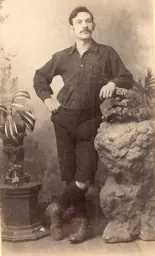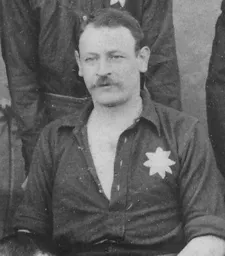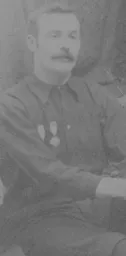The Luton Reporter -
“The English Cup Match. The chances of the Luton Club obtaining a good position in this division for the English Challenge Cup qualifying competition have been extinguished very quickly, the 93rd Highlanders having vanquished them in surprisingly easy style on Saturday last. When it became known that Luton were drawn against what was regarded as a formidable combination the hopes of their supporters sank rapidly, and the match was generally looked upon as a foregone conclusion in favour of the strangers. The team had obtained the choice of grounds, but they elected to visit Luton, where there was a better chance of obtaining a good “gate,” a consideration which is becoming more and more important in football clubs throughout the country. The Scotchmen certainly came with an excellent record. They had been in existence as a football club for five years, and during that time they had been defeated only three times. That they were no mean opponents was further demonstrated by the fact that in one year they had scored 127 goals, against only four obtained against them, while those familiar with the doings of the more important elevens remembered that they had previously won the Army and Navy Cup. Their avocation gave sufficient promise that they would have plenty of exercise, while on the other hand they had to meet the foemen who seldom have the opportunity to play together, and who certainly have had but little individual practice this season. The alterations which are at present taking place in the Town Club’s filed precluded the possibility of the match taking place there, and it was accordingly played in a field attached to the Bury Park Farm, which proved adequately adapted to the purpose. The game had been announced to commence at 3 o’clock but it was not until long after that time that a start was made. In the meantime a large number of spectators had assembled, despite the increased charge for admission, and, the weather being brilliantly fine, there seemed every prospect of an enjoyable afternoon’s sport.
Luton lost the toss, and had to play during the first half of the game uphill against the wind and sun. The teams faced the centre line as follows:- Luton: T. Read, goal; G. Humphrey and A. Sanders, backs; E.H. Lomax, A. Taylor and G.J. Saddington, half backs; L.C.R. Thring (captain), centre; W. Miller, J.C. Lomax, left wing; H. Whitby and F.K. Whitby, right wing, forwards. 93rd Highlanders: Robertson, goal; Stirratt and Kudems (captain), backs; McMillan, Thomson and Stevenson, half-backs; Urquhart, centre; Roy, Duffie, left wing; McLafferty and Young, right wing, forwards. Thring kicked off for Luton at about a quarter to 4, and the visitors at once obtained possession. The ball was rapidly conveyed to the vicinity of the home goal, where “hands” was given in dangerous proximity to Read’s charge. the scrimmage which followed the free kick resulted in a “corner” being conceded by the Lutonians. The danger was averted by some good kicking by the backs, and the leather was taken along the outside line by the local forwards. They were deprived of possession, however, and the soldiers gave a slight indication of their powers by passing brilliantly right up the field. The run resulted in one of the forward division getting too far ahead and the “offside” rule was applied, Luton being allowed an unimpeded kick. Similar ill luck was experienced very shortly afterwards after some very pretty play by the right wing forwards. Thring and Taylor rendered themselves conspicuous hereabouts on behalf of their side, while Saddington had relieved his comrades once or twice in good style. The visitors continued to press and a “corner” soon fell to them, this being quickly followed by “hands” in the mouth of the home fortress. The kick was converted into a “corner” by one of the “straw plaiters,” but no more resulted. The Luton men thereafter transferred the operations into their foemen’s territory and at one time Thring looked like scoring, but he was fouled in the back by McMillan, and the claim for a free kick was allowed. J.C. Lomax distinguished himself next by a brilliant run, but his opponents were too numerous in the neighbourhood of their citadel, and the assault ended in a goal-kick. The Town men continued to attack in a spirited manner and two or three times the ball went behind the goal-line. At length the Highlanders turned the tables by rushing the leather to the opposite end and obtaining a “corner” from Sanders. The ball was kicked into the centre with great precision, but one of the Luton forwards booted it out. The enthusiasm of the onlookers was next aroused by J.C. Lomax, who made a very fine run, and having eluded the opposing backs took a shot at goal which missed by about a foot. Thring seemed to be a marked man about this time, for he was twice charged in the back by the centre half-back within a few minutes, and each time his adversary received a well-deserved groan from the crowd. In the meantime Read had defended his charge in a first-class style, one shot being fisted out after seeming as though it must score. The best run which had been made up to now was made by Miller, who took the sphere right up his wing in spite of his opponents’ efforts to stop him. He had been showing good form all through, and was loudly applauded. The Highlanders very shortly afterwards kicked the ball through the Luton uprights, but the point was disallowed on the ground that “hands” had been given previously. But they played up well and eventually secured the first notch in the match from a struggle in front of the home goal. The most notable incident from now until half-time was that the Luton captain was a fourth time fouled by McMillan, who was cautioned by the referee. At the mid way stage of the game the score stood: Highlanders 1; Luton nil. When ends were changed it was found that the slight disadvantage which the home team had to face at the outset had disappeared, for the wind had dropped and the sun was almost hidden. The contest had been fairly even to this point, and it was thought by many of the spectators that the local eleven might at least equalise. Their hope were destined to be soon extinguished, however, for in less than two minutes after the resumption a second goal was placed to the credit of the Scotchmen. A third point was added after a very little time, and it seemed that the Lutonians became most inexcusably demoralised. Their combination had not been at all good at any time, but now they seemed to fall to pieces and give up heart. Their opponents, on the other hand, played with even better combination than before, and gave such an exhibition of the correct game as has rarely been witnessed in the town. Play was almost entirely confined to the Luton side of the line, and at length a fourth point was scored, the ball going through off Sanders head. This was followed in rapid succession by a fifth , and then the partisans of the Luton Town abandoned all hope. So certain was the defeat, indeed, that they eagerly seized the opportunity to bestow lavish applause upon good defensive play. They were evidently thankful for small mercies, but their sense of mortification was deepened by two more goals being added in dashing style. Ernest Lomax was injured slightly just before the finish, but he able to continue playing. At the end the Highlanders had qualified for the second round by seven goals to nil, the points being secured as follows: Urquhart, 3; Roy, 1; McLafferty, 1; Young, 2. The umpires were Lieut. Whatman (Highlanders) and Mr R. Healing (Luton) while Mr C. Squires, of the London Association, acted as referee.
It only remains to account in some way for the defeat of the local team, and this is not a difficult task. It is an undeniable fact that the visitors were far the better team. Their combination was all that could be desired, admirable short passing and correct heading being characteristic of the whole of them. Few mistakes were made, and the men were always in their places, thus avoiding the confused rushing to and fro which is so frequently witnessed. The members of the team relied upon one another, and the result was as might be expected. The Luton team, on the contrary, were at sixes and sevens, and there was an utter lack of combination. The forwards were but rarely in their places, and when they did obtain possession of the ball they almost invariably threw away their chances by indulging in selfish play. In this respect they might have learned a valuable lesson from the tactics of their adversaries, for it is certain that until they have altered their efforts they will never do well against good teams. It is also true that the Luton team seemed to relax their efforts when a goal had been registered against them, and to altogether lose heart. The Highlanders were of course in excellent trim, and the fact that they were in condition no doubt assisted in achieving the result, but it was above all the pleasing unity which prevailed amongst them that was accountable for the victory. On the Luton side the chief credit is due to Miller and Sanders, whilst Urquhart was the pick of the visitors”.












